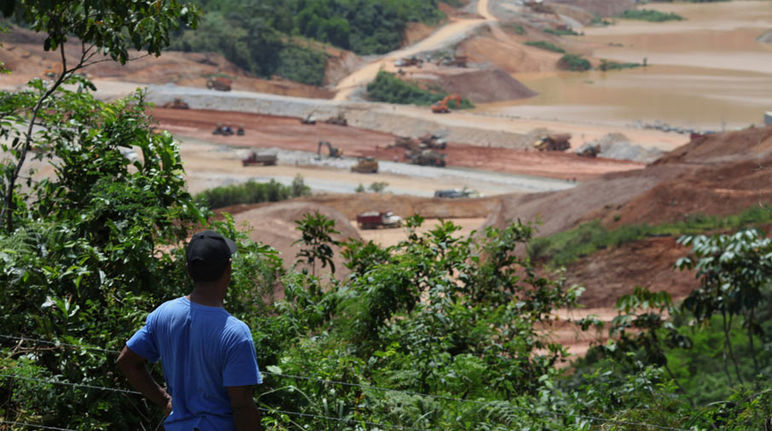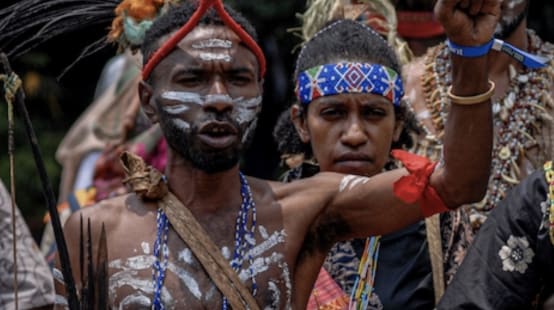Toxic gold mining in the Caribbean
 Speechless in the face of destruction
Speechless in the face of destruction
With its magnificent beaches and rolling green hills, the Dominican Republic is a vacation paradise. That could soon be history, however. Two Canadian companies intend to mine for gold on a massive scale in the rainforest. The cyanide to be used would poison the water and soils. Please support the protest of the Dominicans.
Call to actionTo: The government of the Dominican Republic, Mr. Peter Munk, CEO, Barrick; Mr. Charles A. Jeannes, CEO, Goldcorps
“”
“I’m too old for this. I’m not going to be driven off of my land again,” says Juliana Guzman, a farmer from La Cerca. The walls of her house are riddled with cracks from the explosions that shake the ground every day. Her neighbors from the agricultural cooperative show moldy cocoa pods from their harvest, which has already been tainted by chemicals used in the trial operation of the Pueblo Viejo gold mine. Highly toxic cyanide, which is used in gold mining, is borne by rivers into the soils of the region, inflicting considerable harm.
The village of La Cerca is located in the central highlands of the Dominican Republic. It is surrounded by dense rainforest, home to endemic species such as the highly endangered solenodon. The Canadian companies Barrick and Goldcorps are set to begin mining for gold in December 2012. Up to 24 tons of cyanide will be required daily by the Pueblo Viejo mine. “Using cyanide is suicide in installments,” warns Domingo Abreu of the National Environmental Assembly (ANA). And yet, gold mining is actually superfluous. Only 11 percent of the gold mined is used industrially – a quantity that can be obtained through recycling. The rest is used as an unproductive capital investment and for jewelry.
The cyanide is especially dangerous for the aquatic environment. Rivers originate in the region, which is also home to the largest freshwater reservoir in the country – one that supplies the entire island nation. In the terms of its contract, Barrick ensured that it cannot be held liable for environmental damage. The Dominican population has taken to the streets in response. A coalition of 100 organizations is calling for the annulment of the contracts with the mining companies.
Please help them with your signature.
BackgroundBroken promises
Barrick and Goldcorp projects have met with resistance in other countries in the past. Gold mines in the Andean border region between Argentina and Chile and in Peru are the subject of ongoing conflicts between the mining company and the local population. Protests prompted Norway’s government pension fund to sell its shares in Barrick in light of the serious environmental damage that the company’s mining projects regularly leave in their wake.
The project in the Dominican Republic also drew sharp criticism from the outset. The negotiations with the government were not transparent, and the terms of the contract heavily favor the mining company. In the early years, Barrick will pay hardly any taxes and will earn 25 times more from the mining operation than the Dominican government, the de facto owner of the gold. The financially strapped government and the poor population will not profit from the toxic gold mining – on the contrary. Early on, the local residents of the mining area complained about illegal deforestation and contamination of adjacent waters. People who were relocated to make room for the mine received replacement houses, but they are still waiting for the promised farmland. While the farmers have roofs over their heads, they have no land under their feet. Not only environmentalists and farmers, but also the trade unions are up in arms. The mining companies promised long-term jobs, yet they laid off the majority of the workers after the preparations for the mine were completed. The situation escalated in late September, when a broad coalition of organizations and thousands of Dominicans demonstrated against the mining operation. The police fired on the protesters without warning, injuring 30, many of them seriously.
Toxic gold mining
A since-abandoned mine in the central mountain range of the Dominican Republic also used cyanide in its operations. The chemical polluted the rivers, ground water and soils of the region – in the middle of the island’s biggest fresh water reservoir. In light of the significant environmental damage caused by mining operations using cyanide, the European Parliament voted in May 2010 to ban cyanide throughout the EU. So far, the European Commission has not agreed to the proposal, though, so there are no binding rules yet. Not only Germany, but also Turkey, the Czech Republic and Hungary have banned the use of cyanide in mining.
To: The government of the Dominican Republic, Mr. Peter Munk, CEO, Barrick; Mr. Charles A. Jeannes, CEO, Goldcorps
Ladies and Gentlemen,
I am very concerned about the plans of the government of the Dominican Republic to permit open-pit gold mining in the central highlands. The Pueblo Viejo mine is located in a sensitive ecosystem, the soils of which are vital for regional agriculture. Rivers and a freshwater reservoir that the entire republic relies on are also nearby. The cyanide used in gold mining threatens to poison the region’s environment, endanger the residents’ food security, and jeopardize the water supply of the entire population of the Dominican Republic.
The two companies operating the Pueblo Viejo mine, Barrick and Goldcorps, are known for their violations of environmental regulations and human rights. In Argentina and Peru, the population is protesting against the pollution of water sources by Barrick’s mines. The Dominicans are therefore taking to the streets and calling for the annulment of the Pueblo Viejo contracts. A broad coalition of 100 Dominican organizations is urging the government and the companies to cancel the mining project. They also criticize the lack of transparency with which the contracts were concluded, the tax breaks granted to the mining companies to the detriment of the Dominican government, the failure of Barrick and Goldcorps to pay compensation, and the unfulfilled promise of secure jobs.
Gold mining is not only a threat to social stability and the environment, but also to alternative forms of economic development in the Dominican Republic.
In solidarity with the Dominican people and out of deep concern for the environment in your country, I call on you to annul the contract at the Pueblo Viejo mine.
Sincerely,













 Recent successes
Recent successes